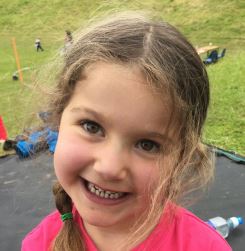Monday 26 August 2019
On Sunday 8 September, around 150 wonderful people are going to be organising or taking part in the Shine For Shani Pulse Challenge.
A 20 mile walk or run from Great Ormond Street Hospital to Shani's home town of Borehamwood.
There are 13 and 5.75 mile options as well, with 5.75 miles chosen to remember how old Shani was.
We're hoping to raise over £20,000 from the event to help save children's lives,
to help kids with complex and life-limiting heart conditions like Shani had,
to help them survive heart transplants and lead the sort of fun lives that kids should have -
filled with the love of friends and family,
and with the wonder and joy of new and exciting experiences,
riding a bike,
opening birthday presents,
splashing in puddles and paddling pools,
dressing up as a princess,
being in a school Chanukah play,
collecting stones on a beach,
greeting Daddy when he gets home,
having a story before bed,
of smiling
and laughing,
like Shani did.
The Pulse Challenge has been a big part of our lives over the past few months.
Many amazing friends have given up countless days and evenings to help us organise and plan, to walk and check the route, to cajole and convince people to donate money, food and raffle prizes, and to find marshals and sponsors.
Working with our amazing friends is a reward in itself - we know how much they loved Shani, and we feel blessed that they want to help us create something good and positive out of tragedy and despair.
We visited Shani's graveside last week, it felt right to go and see her in advance of the walk, and to check the Octonauts, pink glass beads, and pebbles from the seaside that sit on her gravestone.
It hurts to visit her grave, it hurts to put so much energy into organising a walk in her name, and it hurts to write this blog,
but it's worth it.
It's my 'option b'.
The other option is to curl up into a ball,
to sink under the water,
or to pretend it's not real,
none of which allow me to try and both live AND grieve,
to remember Shani and to make a difference,
to feel like there's still something to do.
With Shine For Shani, we want to make a difference to the world in Shani's name.
We're doing well but there is so much more that could be done.
And so many children's lives that could be impacted for good as a result.
As I mentioned in a blog last year, there is Jewish prayer in the Shema that perfectly sums up what it is that Shine For Shani is trying to achieve for children with difficult heart conditions:
'With all your heart and with all your soul and with all your might.' Deuteronomy 6:4
I used to say this for Shani in the hope that it would make a difference to her, but for me it has now become a prayer for the children that we are trying to support, that they can have a whole and healthy heart, that they can live a full and vital life, and that they can do so with strength and with courage and with determination.
As Rabbi Tarfon said in the Jewish book of Ethics of the Fathers almost 2,000 years ago:
'You are not expected to complete the task, but neither are you free to avoid it.' Pirkei Avot 2:21
We're not going to be able to raise enough money to help solve every child's complex heart condition and to enable all of them to live long and happy lives,
but we can make a real difference,
and so we should.
